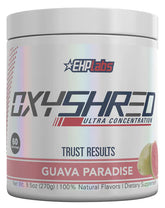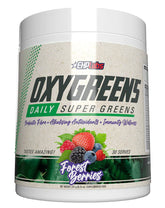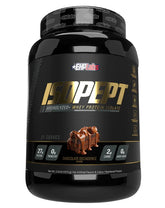Why Protein Is Your Best Friend During And After Weight Loss
Protein isn’t just a buzzword in the fitness world; it’s a cornerstone of optimal health and wellness. It’s the building block your body relies on for muscle repair, hormone synthesis, blood sugar stabilization, and even bone health.
But when it comes to weight loss and maintaining that hard-earned physique, protein becomes even more critical. Let's dive into why protein is a non-negotiable part of your weight loss journey and how it helps you keep the weight off for good.
The Role of Protein in Weight Loss & Maintenance
Increased Satiety: Your Hunger Solution
If you’ve ever tried to lose fat, you know it’s all about creating a calorie deficit—burning more energy than you’re taking in. Sounds simple, right? But anyone who’s been in a calorie deficit knows that hunger can quickly derail your progress.
Enter the magical substance: protein.
Protein is your secret weapon because it keeps you feeling fuller for longer compared to carbs or fats. When you structure your meals around protein and add carbs and fats as complementary players, you’re more likely to stay satisfied after eating. This means less mindless snacking, less overeating, and a more consistent calorie deficit over time.
And that, my friend, is how you stick to your plan and shed fat effectively.
Boost Your Calorie Burning With Protein
Your Total Daily Energy Expenditure (TDEE) is the total number of calories your body burns in a day. It’s a key player in your fat loss and weight maintenance game. Your TDEE is made up of:
- Basal Metabolic Rate (BMR): The calories you burn just to stay alive—think of it as the energy cost of lying in bed all day.
- Exercise Activity Thermogenesis (EAT): Calories burned during your workouts.
- Non-Exercise Activity Thermogenesis (NEAT): Calories burned from all the other stuff—walking the dog, cleaning the house, etc.
- Thermic Effect of Feeding (TEF): Calories burned digesting and processing food.
Protein has a higher thermic effect than carbs or fats. Your body has to work harder (burn more calories) to digest and absorb protein. So, by eating more protein, you’re not just fuelling your muscles; you’re subtly boosting your metabolism throughout the day. Over time, this adds up, making your fat loss efforts even more effective.
Protect Your Muscle, Maintain Your Metabolism
When you’re in a calorie deficit, you risk losing not just fat but muscle too. And muscle is metabolically expensive—it burns more calories at rest than fat. So when calories are scarce, your body might try to shed muscle to conserve energy.
But you can fight back.
To preserve your lean muscle while losing fat, you need two things: consistent resistance training (3-4 times a week) and a solid protein intake. This dynamic duo sends a clear message to your body: “We’re keeping this muscle!”
And here’s the payoff—maintaining your muscle mass helps keep your metabolism high, even as you lose fat. That means you burn more calories at rest, making it easier to maintain your weight loss in the long run.
How Much Protein Should You Eat?
The standard recommendation is 0.8 grams per kilogram of body weight. For a 80 kg person, that’s about 64 grams of protein per day. But let’s be real—this amount is the bare minimum your body needs to survive, not thrive.
If you’re active, hitting the gym regularly, or aiming to lose fat and build muscle, you need more. Aiming for around 2.2 grams of protein per kilogram of body weight is a much better target. So if you weigh 80 kg, shoot for 176 grams of protein per day.
Spread this intake evenly across your meals to optimize digestion and muscle protein synthesis throughout the day. This consistent “drip-feed” of amino acids keeps your muscles fuelled and your body in a state of readiness for repair and growth.
The Best High-Protein Foods
Let’s talk about where to get that protein. A lot of people struggle with getting enough protein, especially if they’re sticking to the outdated food pyramid. If you’re ready to level up your nutrition game, here are some top picks for high-quality protein sources:
- Lean meats: Beef, pork, veal and kangaroo
- Poultry: Chicken, turkey, and even duck.
- Seafood: Salmon, tuna, shrimp, oysters—packed with protein and omega-3s.
- Eggs & egg whites: Versatile and nutrient-dense.
- Dairy: Cottage cheese, Greek yogurt, and various cheeses.
- Legumes: Beans, lentils—great plant-based protein sources.
- Protein Shakes: Whey, egg, vegan, or clear protein powders to fill in the gaps.
Takeaway
Protein isn’t just important—it’s essential for anyone serious about losing fat, building muscle, and keeping that excess, unwanted weight off for good. It helps control hunger, boosts your metabolism, and protects your hard-earned muscle mass.
A solid rule of thumb is to aim for about 2.2 grams of protein per kilogram of body weight from high-quality sources. Track your intake, spread it across your meals, and watch how it transforms your physique and performance.
Fuel your body right with adequate protein intake!
Editor’s Picks
Gold Standard 100% Whey by Optimum Nutrition
- From $71.90
$85.90- From $71.90
- Unit price
- / per
OxyWhey by EHP Labs
- From $54.90
$89.90- From $54.90
- Unit price
- / per
OxyShred by EHP Labs
- $62.90
$79.90- $62.90
- Unit price
- / per
OxyGreens by EHP Labs
- $41.90
$57.90- $41.90
- Unit price
- / per
IsoPept by EHP Labs
- $65.90
$99.90- $65.90
- Unit price
- / per















